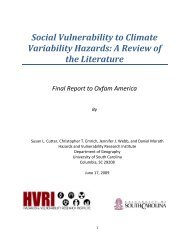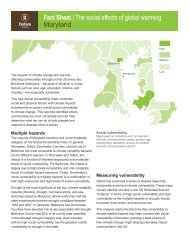Poverty Footprint Study on how the Coca Cola - Oxfam America
Poverty Footprint Study on how the Coca Cola - Oxfam America
Poverty Footprint Study on how the Coca Cola - Oxfam America
Create successful ePaper yourself
Turn your PDF publications into a flip-book with our unique Google optimized e-Paper software.
43. This was developed by <strong>the</strong> University of South Africa’s Bureau of Market Research for <strong>Coca</strong>-<strong>Cola</strong> South Africa in 2000. These multipliers were adjusted for use<br />
<strong>on</strong> this project by comparing <strong>the</strong> import-intensity of <strong>the</strong> Zambian ec<strong>on</strong>omy vis-à-vis <strong>the</strong> South African ec<strong>on</strong>omy, reflecting <strong>the</strong> likelihood of impact leakage through<br />
imports. This was d<strong>on</strong>e by obtaining <strong>the</strong> percentage of imports to GDP for <strong>the</strong> two countries and averaging imports over <strong>the</strong> last 10 years, in order to reduce<br />
<strong>the</strong> impact of picking a <strong>on</strong>e-off year with unusual levels of imports. As <strong>the</strong> Zambian ec<strong>on</strong>omy has higher import intensity than <strong>the</strong> South African ec<strong>on</strong>omy, <strong>the</strong><br />
multipliers are lower in Zambia due to increased leakages via imports. Therefore, an output multiplier of 1.75 for South Africa reduced to 1.53 for Zambia.<br />
44. Employees in El Salvador are appointed through Compania de Servicios de El Salvador SA, whose parent company is Refreshment Product Services, Inc.<br />
45. As at <strong>the</strong> end of 2009, The <strong>Coca</strong>-<strong>Cola</strong> Company had two employees in Zambia, who were paid by <strong>the</strong> local bottler, Zambrew. As of today,<br />
The <strong>Coca</strong>-<strong>Cola</strong> Company pays <strong>the</strong> associate via an independent entity called DCDM. DCDM is c<strong>on</strong>tracted by <strong>the</strong> <strong>Coca</strong>-<strong>Cola</strong> Indian<br />
Ocean Islands (CCIOI) which is a subsidiary of <strong>Coca</strong>-<strong>Cola</strong> Export Corporati<strong>on</strong>, which is owned by The <strong>Coca</strong>-<strong>Cola</strong> Company.<br />
46. This figure includes 354 direct jobs from Zambian Breweries and two local jobs from Zambrew<br />
47. A labor multiplier of 10.66 for South Africa reduced to 9.51 for Zambia.<br />
48. See endnote 42 for fur<strong>the</strong>r details.<br />
49. These percentages are not always comparable due to <strong>the</strong> different business types and cost structures.<br />
50. These taxes are predominantely paid by SABMiller but also include some taxes paid by TCCC in each country<br />
51. The ILO states that El Salvadorian informal employment as a proporti<strong>on</strong> of n<strong>on</strong>-agricultural employment is 57%. Women and Men in <strong>the</strong> Informal<br />
Ec<strong>on</strong>omy: A statistical picture, ILO (2002), http://www.wiego.org/publicati<strong>on</strong>s/women%20and%20men%20in%20<strong>the</strong>%20informal%20ec<strong>on</strong>omy.pdf.<br />
52. ILO states that Zambian informal employment as a proporti<strong>on</strong> of total employment (including agriculture) is 88%. Policy Reforms and<br />
Employment Relati<strong>on</strong>s in Zambia, ILO (2008), http://www.ilo.org/public/english/regi<strong>on</strong>/afpro/harare/download/issues_paper_29.pdf<br />
53. World Bank. World Development Indicators. http://devdata.worldbank.org<br />
54. A total of 31 workers were interviewed in two focus group discussi<strong>on</strong>s held at <strong>the</strong> Lusaka and Ndola bottling plants and included permanent and temporary employees.<br />
55. The dominati<strong>on</strong> of a market by a few firms.<br />
56. PROCAÑA is <strong>the</strong> <strong>on</strong>ly producers associati<strong>on</strong> that is a member of <strong>the</strong> Nati<strong>on</strong>al Sugar Council (CONSAA), <strong>the</strong> nati<strong>on</strong>al<br />
agricultural business associati<strong>on</strong> (CAMAGRO) and <strong>the</strong> Nati<strong>on</strong>al Associati<strong>on</strong> of Private Businesses (ANEP).<br />
57. Focus group sessi<strong>on</strong> at Zambia bottling operati<strong>on</strong>s included 31 people in total.<br />
58. See http://www.oxfamamerica.org/issues/equality-for-women/background.<br />
59. Gender equality and social instituti<strong>on</strong>s in Zambia, http://genderindex.org/country/zambia.<br />
60. Gender equality and social instituti<strong>on</strong>s in El Salvador, http://genderindex.org/country/el-salvador.<br />
61. Kaleya Smallholders Company Ltd (KASCOL) is a special case. It manages <strong>the</strong> Kaleya Smallholder Trust, started in 1981 by Zambia Sugar Company<br />
(ZSC), Development Bank of Zambia, Comm<strong>on</strong>wealth Development Cooperati<strong>on</strong> and Barclays Bank as a poverty-alleviati<strong>on</strong> strategy and expansi<strong>on</strong><br />
strategy by ZSC to provide more cane for milling operati<strong>on</strong>s. Smallholders are organized into trusts to represent <strong>the</strong>ir interests and to purchase shares<br />
in <strong>the</strong> Kaleya Smallholders Company Ltd. Mazabuka Sugarcane Trust holds 25 percent of <strong>the</strong> shares in Kaleya <strong>on</strong> behalf of smallholder farmers.<br />
62. Results of surveys made to Nejapa and San Salvador stores (June 2009).<br />
63. http://www.un.org/News/Press/docs/2010/ga10967.doc.htm<br />
64. Results of surveys made to Nejapa and San Salvador stores (June 2009).<br />
65. According to TCCC’s research<br />
66. According to TCCC’s research<br />
67. The figures are net from recovery (i.e. from The <strong>Coca</strong>-<strong>Cola</strong> Company c<strong>on</strong>tributi<strong>on</strong>s).<br />
68. Zambian Breweries Management Informati<strong>on</strong>, received from Dave Kvalsvig, Finance Director, Zambian Breweries (April15, 2009).<br />
69. According to informati<strong>on</strong> provided by Fund Azúcar’s executive director, $1.8 milli<strong>on</strong> has been invested in child labor eradicati<strong>on</strong> programs during <strong>the</strong> period 2003 to 2009




